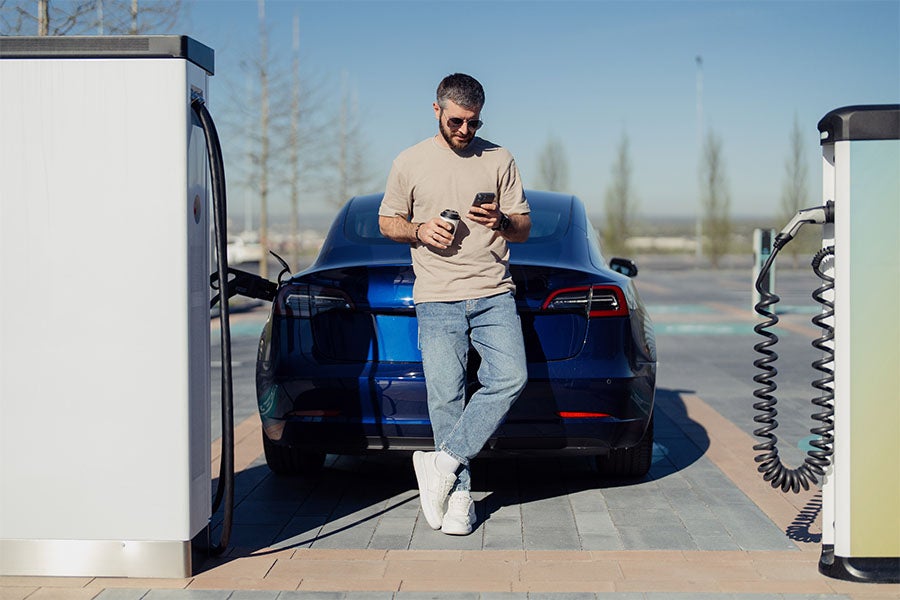Energy saving advice
How long does it take to charge an electric car?
11 Dec 2024 • 5 minutes

Energy saving advice
11 Dec 2024 • 5 minutes

As electric cars grow in popularity, understanding charging times is important for anyone who’s thinking of making the switch, or even for current owners planning their journeys.
In this guide, we’ll break down the factors that affect charging speed and explore how long it really takes to get your electric car back on the road. Whether you’re charging at home or on the go, we’ve got all the key information you need.
There are several things that affect the charging speed of an electric car. The most common examples include:
Let’s take a look at the most common types of charging methods for electric cars and their typical charging speeds*.
| How long does it take to charge an electric car at home? Our breakdown | |||
|---|---|---|---|
| Car model | Battery size | Charger capacity | Charging time |
| Small EV (e.g. Nissan Leaf) | 40 kWh | 7 kWh | 5-6 hours |
| Mid-size EV (e.g. Tesla Model 3) | 60 kWh | 7 kWh | 8-9 hours |
| Large EV (e.g. Audi e-tron) | 95 kWh | 7 kWh | 13-14 hours |
The average size of an electric car battery is around 40 kWh, which will typically take 5-6 hours to charge when using a standard 7 kWh home charger.
Charging an electric car in public typically takes anywhere from 30 minutes to 12 hours, depending on the charger’s power and your car’s battery size.
Public chargers come in a variety of power capacities, ranging from regular 7 kW units to fast and ultra-fast chargers providing up to 350 kW. Most electric cars have batteries ranging between 50 kWh and 100 kWh and the charging time will vary based on these factors.
We’ve already broken down the charging speed of slower 7 kW chargers above, so below we’ve broken down the charging times of faster chargers at public stations:
| How long does it take to charge an electric car at home? Our breakdown | |||
|---|---|---|---|
| Car model | Battery size | Charger capacity | Charging time |
| Small EV (e.g. Nissan Leaf) | 40 kWh | 7 kWh | 5-6 hours |
| Mid-size EV (e.g. Tesla Model 3) | 60 kWh | 7 kWh | 8-9 hours |
| Large EV (e.g. Audi e-tron) | 95 kWh | 7 kWh | 13-14 hours |
Before you find a public charger you can look at places like Zapmap to see the charging capacity of publicly available chargers.
| How long does it take to charge an electric car at home? Our breakdown | |||
|---|---|---|---|
| Car model | Battery size | Charger capacity | Charging time |
| Small EV (e.g. Nissan Leaf) | 40 kWh | 7 kWh | 5-6 hours |
| Mid-size EV (e.g. Tesla Model 3) | 60 kWh | 7 kWh | 8-9 hours |
| Large EV (e.g. Audi e-tron) | 95 kWh | 7 kWh | 13-14 hours |
Electric cars can't charge faster due to the limitations of the battery and the need to prevent overheating, which can damage the battery. Charging slows down as the battery fills up to protect its lifespan, and both the car and charger have power limits.
While technology is improving, current systems prioritise battery health over faster charging.
How long you can drive an electric car before recharging depends on the car's battery size, driving conditions, and efficiency. On average, most electric cars have a range of 150 to 300 miles on a full charge.
Yes, you can charge an electric car based on the distance you need to travel by estimating how much energy is required for the trip. Obviously, this won’t work for all distances but for most reasonable-length trips you should be able to charge your car enough before your journey.
Typically, an electric car can go between 150 - 300 miles on a single full charge. This is around three to eight hours, depending on the capacity of your car’s battery.
Make the switch to efficient, hassle-free EV charging at home with HomeServe, powered by BOXT. Our expert team is here to help you install an EV charger with transparent fixed prices and effortless installation services.
You’ll be able to charge your electric vehicle faster, more safely, and more conveniently. Enjoy seamless service from start to finish, ensuring your home is ready for the future of driving!
*Charging speeds calculated by dividing car battery size by charger capacity
Our help & advice articles cover Plumbing, Home heating, Electrical, Energy-saving and Home maintenance.